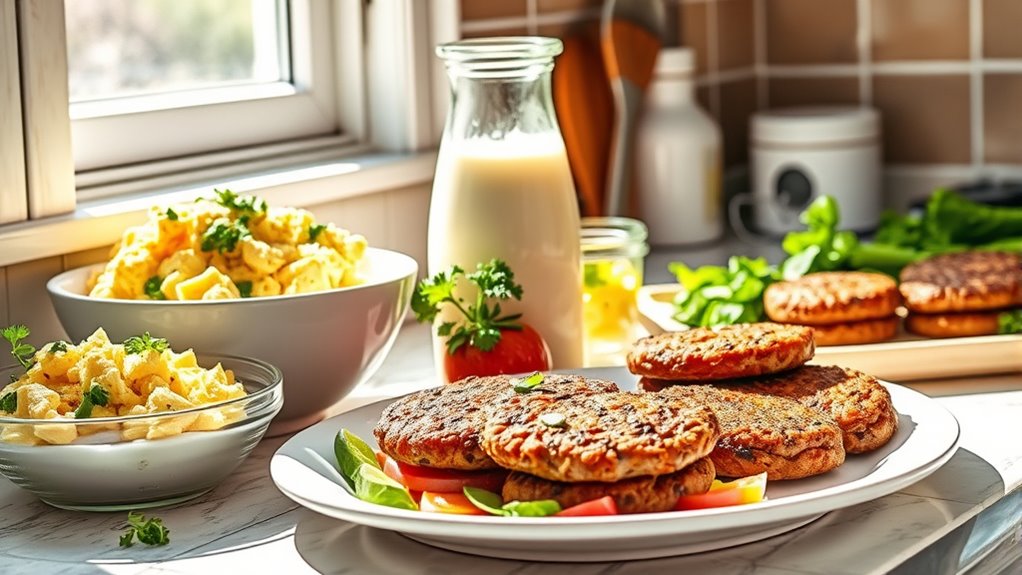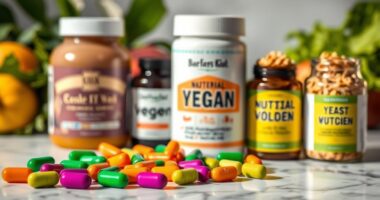To replace animal products, explore plant-based options like tofu, tempeh, lentils, and chickpeas for meat alternatives. Use plant-based milks such as almond, soy, or oat milk in your recipes and drinks. For eggs, try flaxseed or chia seed mixtures as binders in baking. Incorporate vegan ingredients like coconut oil or applesauce to achieve the desired textures. Keep exploring these options to make your switch smooth and satisfying.
Key Takeaways
- Use plant-based proteins like tofu, tempeh, lentils, and chickpeas to replace meat in various dishes.
- Substitute dairy with plant-based milks such as almond, soy, oat, or cashew milk for drinks and cooking.
- Replace eggs with flaxseed or chia seed mixtures, which act as effective binding agents in baking.
- Incorporate vegan baking ingredients like coconut oil, applesauce, or commercial egg replacers to achieve desired textures.
- Transition smoothly by familiarizing yourself with these alternatives to support health, taste, and environmental goals.

Have you ever wondered if you could reduce your environmental impact and improve your health by replacing animal products? Making the switch isn’t as complicated as it might seem, especially once you explore the variety of vegan alternatives available. For example, plant-based proteins are now more accessible and can easily replace meat in your favorite dishes. From tofu and tempeh to lentils and chickpeas, you can create hearty, satisfying meals without relying on animal flesh. These options are not only lower in saturated fat but also packed with fiber and essential nutrients, supporting your overall well-being.
When it comes to dairy, there’s a wide range of options that work perfectly as substitutes. Plant-based milks like almond, soy, oat, and cashew milk have become staples in many households. They’re easy to incorporate into your daily routine—whether you’re pouring a glass, adding it to coffee, or using it in recipes. Dairy-free baking has also become a breeze with these alternatives. You can replace traditional milk in recipes with plant-based milks without sacrificing flavor or texture. For baking, you might find that soy or almond milk works especially well, giving your baked goods moisture and richness. Many brands even offer dairy-free butter and cream, making your favorite comfort foods vegan-friendly without sacrificing taste.
Switching from animal-based products to vegan alternatives doesn’t mean you have to give up the foods you love. For eggs, there are numerous plant-based options like flaxseed or chia seed mixtures that work as egg replacers in baking, especially in recipes for muffins, pancakes, or cookies. These substitutes help bind ingredients just like eggs do, and they’re easy to prepare—simply mix ground seeds with water and let them sit for a few minutes. This approach is not only convenient but also adds extra fiber to your baked goods. Plus, with dairy-free baking, you can experiment with ingredients like coconut oil, applesauce, or commercial egg replacers to tailor recipes to your taste.
Adopting a plant-based lifestyle might seem intimidating at first, but it’s straightforward once you familiarize yourself with these alternatives. You’ll find that incorporating plant-based proteins, dairy free baking, and other vegan options can be seamless, tasty, and environmentally friendly. Whether you’re cooking dinner or baking a sweet treat, these substitutes allow you to enjoy your favorite foods without animal products, all while supporting your health and reducing your ecological footprint. Additionally, understanding projector contrast ratio can help you select items that offer better visual quality when creating a cozy, animal-product-free home environment.
Frequently Asked Questions
Are Vegan Substitutes Nutritionally Comparable to Animal Products?
Vegan substitutes can be nutritionally comparable to animal products, but it depends on your choices. A thorough nutritional analysis shows that many plant-based options, like fortified plant milks and legumes, provide essential nutrients such as protein, calcium, and vitamins. However, some may lack certain nutrients like B12 or omega-3s, so you should consider supplementing or choosing fortified products. Overall, with proper planning, vegan alternatives support your health goals effectively.
How Do Vegan Options Impact Cooking and Baking Textures?
You’ll find vegan options often create exciting texture variation in your dishes, sometimes mimicking the chewiness of meat or the creaminess of dairy. While the flavor adaptation can be subtle or bold, these alternatives may alter baking or cooking textures, requiring adjustments like extra moisture or binding agents. With experimentation, you’ll discover how plant-based ingredients can enhance your culinary creativity without sacrificing the desired consistency or taste.
Can Vegan Alternatives Be Used in Traditional Recipes?
Yes, you can use vegan alternatives in traditional recipes. You’ll want to adjust your cooking techniques slightly, as plant-based ingredients often behave differently. For example, using aquafaba as an egg replacer may require a different mixing method. Pay attention to flavor profiles, ensuring your vegan substitutes complement the dish’s overall taste. With some experimentation, you can successfully adapt classic recipes to be fully vegan without sacrificing flavor or texture.
Are Vegan Products Suitable for People With Allergies?
Imagine a vibrant garden where each plant is tailored to specific needs. Vegan products can be suitable if you have dairy allergies or nut sensitivities, but you must read labels carefully. Some alternatives, like nut-based milks, might trigger sensitivities, while others, like oat or rice milk, are gentler. Always check ingredients to ascertain they fit your allergy profile, turning your kitchen into a safe, allergy-friendly haven.
What Are the Environmental Benefits of Choosing Vegan Options?
Choosing vegan options helps you reduce your carbon footprint and supports sustainable farming practices. Plant-based diets require less land, water, and energy compared to animal agriculture, leading to lower greenhouse gas emissions. By making this switch, you contribute to environmental preservation, promote biodiversity, and help combat climate change. Your decision to go vegan has a positive impact on the planet, making it a responsible and eco-friendly choice for a healthier future.
Conclusion
Switching to vegan alternatives is easier than ever, helping you reduce your environmental impact and support animal welfare. Did you know that adopting plant-based diets can cut your carbon footprint by up to 50%? By choosing options like plant-based milks, eggs, and meats, you’re making a positive change for the planet and your health. So go ahead, explore these tasty substitutes and enjoy a more compassionate, sustainable lifestyle today.










